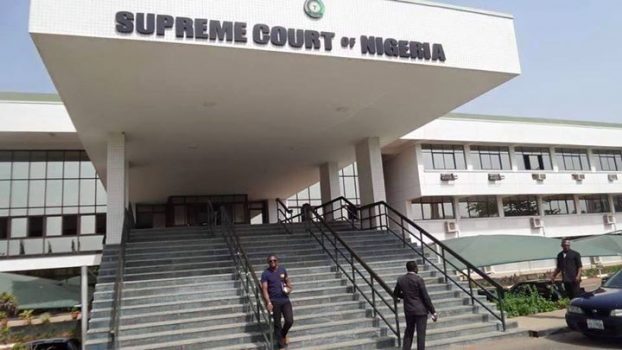 The Supreme Court has issued a ruling barring the Central Bank of Nigeria (CBN), the Accountant General of the Federation, and other agencies from releasing funds to the Rivers State government until it complies with court orders. The apex court described the state’s actions as flagrant disobedience to judicial directives.
The Supreme Court has issued a ruling barring the Central Bank of Nigeria (CBN), the Accountant General of the Federation, and other agencies from releasing funds to the Rivers State government until it complies with court orders. The apex court described the state’s actions as flagrant disobedience to judicial directives.
In a one-hour, thirty-six-minute judgment delivered by Justice Emmanuel Akomaye, a five-man panel of the court unanimously dismissed the cross-appeal filed by Governor Siminalayi Fubara. The appeal challenged the legitimacy of the Rivers State House of Assembly, presided over by Speaker Martin Amaewhule.
The Supreme Court ruled that Governor Fubara’s presentation of the 2024 budget before a four-member Assembly was invalid. The court emphasized that denying twenty-eight constituencies effective representation violated a previous court order mandating Fubara to present the budget before a validly constituted Assembly led by Amaewhule. Consequently, the court ordered Amaewhule to reconvene the full Assembly immediately.
Furthermore, the court condemned Governor Fubara’s handling of the defection of twenty-eight Assembly members, labeling it an act of “brigandage and dictatorship” aimed at obstructing the House’s legislative duties. The demolition of the Rivers State House of Assembly complex by Fubara was also criticized as an abuse of executive power designed to frustrate the Assembly’s functions.
In a separate judgment, Justice Jamilu Tukur declared the local government elections conducted by the Rivers State Independent Electoral Commission on October 5, 2024, invalid. The ruling cited gross violations of the Electoral Act, including continued voter registration after the announcement of the election date. The court held that the electoral process was fundamentally flawed, contravening Section 150 of the Electoral Act.
The ongoing crisis in Rivers State stems from the fallout between former governor and current Minister of the FCT, Nyesom Wike, and his successor, Governor Fubara. This rift led to a split in the House, with 27 members loyal to Wike under Amaewhule’s leadership, while four members, led by Edison Ehie, aligned with Fubara. Fubara later appointed Ehie as his Chief of Staff, leading to further divisions.
The feud has resulted in parallel legislative sittings, an impeachment attempt against the governor, the demolition of the Assembly complex, and the resignation of several pro-Wike commissioners from Fubara’s cabinet. Legal battles have ensued for months, culminating in the Supreme Court’s verdict.
In October 2024, the Court of Appeal in Abuja upheld a Federal High Court ruling that nullified the N800 billion budget passed by the faction led by Edison Ehie. The appellate court dismissed Governor Fubara’s appeal for lacking merit, noting that he withdrew his counter-affidavit in the lower court, rendering his subsequent appeal inadmissible.
The appellate court reaffirmed that the governor must adhere to the rule of law rather than wield executive power arbitrarily. In its unanimous judgment, the court described the situation in the Rivers State House of Assembly as “executive dictatorship” and a “joke taken too far.”

Armed Forces Report Major Gains In November, Rescue 318 Kidnap Victims
CBN Introduces New Nationwide Cash-Withdrawal Limits
PDP Issues Expulsion Certificates To Wike, Fayose, 9 Others In Major Party Purge
Defence Minister Mohammed Badaru Resigns Citing Health Concerns